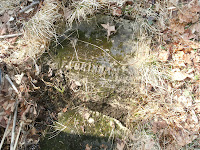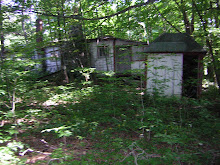“How short the race our children
ran
Cut down in all their bloom
The course but yesterday began
Now finished in the tomb.”
-Inscription at Tower Cemetery
“Transactions with the 'shining
ones,' since they are not always benign, require a certain skill or
things might take an odd turn.” - Roger Davis
In the hills of Savoy, on a
discontinued stretch of Bannis Road a mile south of Adams Road, at
the edge of a rocky wind that's now more hiking trail than avenue,
lies a little stone walled graveyard.
One of more than twenty small burial
grounds speckled throughout the town, at first glance Tower Cemetery
appears remarkable only as yet another reminder of the earlier people
whose homes once dotted these lanes in the more densely populated
days of the 19th century, when Savoy was a booming
stagecoach stop boasting as many as three inns on its main drag.
A closer look at the ten stones that
make up this one family plot suggests its more sorrowful history, the
tale of one family that fared far worse than the average of their
era. On a hushed winter day, the contemplative visitor may intuit
much of the story of Orrin Tower and Florinda Granger and their
vanquished line, a narrative whispered in etched stones and broken
metal, an echo of long ago sadness that has given rise to a rich lore
of prophetic visions and dark deeds.
For They Say that Florinda Granger was
more than merely an unfortunate mother whose brood was cut down by
illnesses and accidents; in the hands of Legend, she is the first
witch of Savoy, whose forecasts of future events came at a terrible
price.
Our most forthcoming source on this
lore is none other than Roger Davis, himself the self-proclaimed
“Witch of Savoy” these last decades, holding court at his Dragon
House until his death two winters ago. Those unfamiliar with this
intriguing local may consult my tribute to his life here, along with
an investigation into the murky events surrounding his death and the
hushed over arson at the Dragon House last year.
“From an early age she predicted
future happenings,” Davis said of Granger in one of his rare
surviving writings, “Her presence was all that was necessary to
heal the sick. When she met Orrin, somehow, she caused him to
believe that she was the most desirable woman he ever met.”
Granger married Tower in 1844, and they
settled on land given by her father, Levi Granger, and Orrin ran a
grain mill on the property.
It was said that she was born weak and consumptive, to a family thought to have long been secretly "of the craft."
It was said that she was born weak and consumptive, to a family thought to have long been secretly "of the craft."
According to the story, some of
Florinda's visions and healings over the years were closely followed
by tragedies within her own family.
From the headstones on Bannis Road, we
know that the summer of 1851 was one of great strife, during which
the Tower family lost first 3 year old daughter on July 28, and four
year old twins Almina and Minerva on August 10, deaths that vital
records of the time attribute to dysentery.
Three years later, on June 6, 1954,
their two sons, 9 year old Elansford and 11 year old Wareham both
drowned in their father's mill pond.
“It is supposed that he and his
brother went in to bathe...” reads an inscription in the little
cemetery.
Other oddities seem to have befallen the Tower family during their years on this Savoy hillside. According to an item in a local paper from 1859, their home was struck by a bolt of lightning during a summer storm. It reportedly rattled down the stove pipe and right into bed with another of the Tower's small children, setting the bed on fire, though no one was hurt.
Other oddities seem to have befallen the Tower family during their years on this Savoy hillside. According to an item in a local paper from 1859, their home was struck by a bolt of lightning during a summer storm. It reportedly rattled down the stove pipe and right into bed with another of the Tower's small children, setting the bed on fire, though no one was hurt.
Sinister rumors came to surround the
misfortunes of the Tower children. Legend is rife with varied
innuendo, some suggesting they were victims of some malevolent side
effect of Florinda's powers, others implying a more direct villainy
on the part of the father.
This was the version favored by Davis,
whose account claims that in 1863, Florinda intercepted an attempt by
Orrin and an anonymous drinking buddy to 'spirit away' then 13
year old daughter Lucy, after which things became eerily quiet in the
Tower home. The latter day Witch of Savoy recalls:
“The waning moon that year coincided
with Samhain, the end of the pagan year, Halloween. Both aspects
aligning made it the optimum timing for endings of all things. All
that day, Florinda was humming something under her breath, off and
on. And that night she dropped a folded paper into the fire. As the
flames consumed the paper, sending it up the chimney and its dancing
sparks to the night above, a message was delivered.”
The next morning, the tale continues,
the bodies of Orrin and his nameless cohort were found floating in
the pond, fatalities written up to a drunken accident, though some
suspected other forces at play.
According to local records, however,
Orrin Tower passed on March 11, 1867. Tower appears to have served
in the Civil War following a stint as one of the town's selectman.
After his return, seven year old daughter Harriet succumbed to
consumption in 1866, which is said to have struck both her parents the
following year. Florinda was declared dead two weeks after her husband, on
March 24. She and Orrin were both 47 at the time of their death.
Two remaining scions of the Tower
family survived a few years longer. Eldest daughter Lucy married
Alfred Burnett, then fell to dysentery in 1871 at the age of 21; a
final daughter Eunice died in 1875 at age 19, giving birth to a child
who also died in the delivery.
Burnett, Lucy's husband, inherited the
Tower house, which burned to the ground in 1915, leaving only the
scant remains of a cellar hole just opposite the tiny cemetery.
 A metal monument now stands in the
center of the tiny burial plot, added sometime later than the graves,
some of which have broken and otherwise become difficult to read.
Where the names and vital dates of family members have been preserved
on the hollow headstone-like structure, the plate containing the name
of Orrin Tower has been conspicuously smashed out. It has been in
this condition for at least twenty years.
A metal monument now stands in the
center of the tiny burial plot, added sometime later than the graves,
some of which have broken and otherwise become difficult to read.
Where the names and vital dates of family members have been preserved
on the hollow headstone-like structure, the plate containing the name
of Orrin Tower has been conspicuously smashed out. It has been in
this condition for at least twenty years.
In the etchings of stones slowly
receding into nature is scattered sundry verses of poetic lament,
such as this:
“Sweet children adieu a long adieu
Till we shall meet above
Then may we join the song with you
And sing redeeming love.”
A curious place, this quiet and
secluded lot nestled in the trees, just down the road from the pond
where the two boys met their doom, and less than a half mile from the
hill where the town's more well known, modern witch set his humble
and mysterious woodland cabin. Sheltered in forest shadows on this
lower ridge of Borden Mountain, this cluster of artifacts mutters an
underlying story of private suffering and unanswered questions... the sum
tale of a family come and entirely gone from the world in less than
25 years.
Sources
Davis, Roger. "Legends and Tales of the Berkshire Hills." Hoosac Trails V. 6, #4 [Dec.1993]
Miller, H. Elmer. History of the Town of Savoy [1879]
Phinney, Jane B. Taking the High Road: Two Hundred Year History of a Hilltown [1997]
Sample, Stephen. Berkshire Burial Grounds Within the State Forests. [1995]
Town of Savoy, Vital Records. 1840-1870
Berkshire County Eagle, July 15, 1859








1 comment:
I came across this last summer while exploring on my bicycle. Thank you for providing a deep and rich history. The woods out here indeed hold an errie presence.
Post a Comment